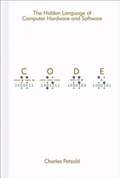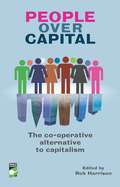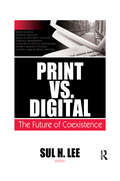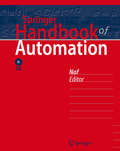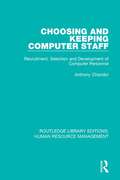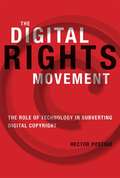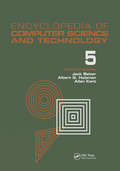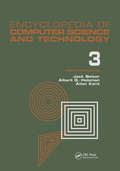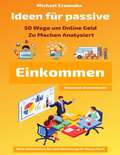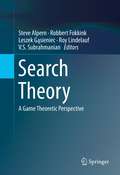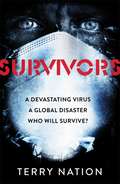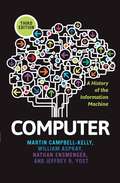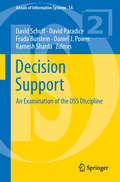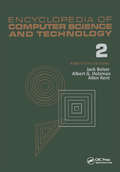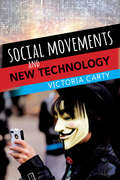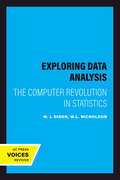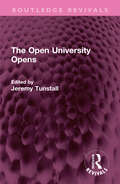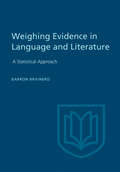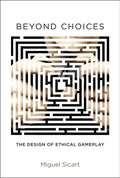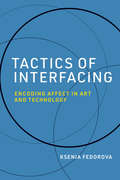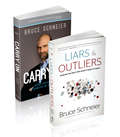- Table View
- List View
Code: The Hidden Language of Computer Hardware and Software
by Charles PetzoldWhat do flashlights, the British invasion, black cats, and seesaws have to do with computers? In CODE, they show us the ingenious ways we manipulate language and invent new means of communicating with each other. And through CODE, we see how this ingenuity and our very human compulsion to communicate have driven the technological innovations of the past two centuries. Using everyday objects and familiar language systems such as Braille and Morse code, author Charles Petzold weaves an illuminating narrative for anyone who's ever wondered about the secret inner life of computers and other smart machines. It's a cleverly illustrated and eminently comprehensible story--and along the way, you'll discover you've gained a real context for understanding today's world of PCs, digital media, and the Internet. No matter what your level of technical savvy, CODE will charm you--and perhaps even awaken the technophile within.
People Over Capital
by Rob HarrisonCapitalism is failing and ordinary people are forced to pay the price. With such deep-rooted problems there is real hunger for alternative ways of organizing our economic system. Answering the question, "Is there a co-operative alternative to capitalism?" this book showcases fourteen responses from economists, academics, co-operators, politicians, and campaigners, exploring both the success and untapped potential of co-operatives. Each essay approaches from a new direction-from the flourishing open source movement to cases of co-operative success in different parts of the world.Rob Harrison has written and commented widely on social change issues for more than twenty years.
Print vs. Digital: The Future of Coexistence (Monographs From The Journal Of Library Administration Ser.)
by Sul H. LeeLibraries are currently confronted by the challenges of managing increasing amounts of electronic information. Print vs. Digital: The Future of Coexistence presents the expert perspectives of eight of America’s leading library administrators on ways to effectively manage digital flow and offers strategies to provide a level of coexistence between digital and print information. This excellent overview explores how to best balance print and electronic resources, and explores important issues such as the selection of electronic resources, improving access to digital information for a larger user base, and effective management of a library’s fiscal and personnel resources. Print vs. Digital: The Future of Coexistence discusses the various challenges libraries now face from the massive influx of digital resources, including the ways that information-seeking behaviors have changed, the search for synergies between print and digital, economics of news preservation, and whether or not the end of print journals is at hand. New ideas and technological advances are explored, including the diverse ways these improvements will impact the future. This well-referenced resource includes useful tables, figures, and photographs. Topics in Print vs. Digital: The Future of Coexistence include: cooperative collection development balance of print and electronic resources evolvement of digital resources in libraries change in research libraries factors influencing the selection of electronic resources disseminating information about scholarly collections impact of digital resources on research behavior and techniques design of digital libraries JSTOR effects of digital information on reference collections transition of print journals to digital formats Print vs. Digital: The Future of Coexistence is a thought provoking, insightful resource on the future of libraries, invaluable for acquisitions, reference, and collection development librarians; and senior and mid-level administrators such as deans, directors, and department heads for public, special, and academic libraries.
Springer Handbook of Automation
by Shimon Y. NofThis handbook incorporates new developments in automation. It also presents a widespread and well-structured conglomeration of new emerging application areas, such as medical systems and health, transportation, security and maintenance, service, construction and retail as well as production or logistics. The handbook is not only an ideal resource for automation experts but also for people new to this expanding field.
Choosing and Keeping Computer Staff: Recruitment, Selection and Development of Computer Personnel (Routledge Library Editions: Human Resource Management)
by Anthony ChandorThis clear and detailed analysis, first published in 1976, of recruitment methods, staff development techniques, staff motivation, and organisational structures will be valuable to data processing managers and personnel officers alike. Its practical flavour and real understanding will also be welcomed by general management. The guidelines and detailed checklists will help cut the direct costs of recruiting and the often astonishingly high indirect costs of rapid staff turnover.
The Digital Rights Movement
by Hector PostigoThe movement against restrictive digital copyright protection arose largely in response to the excesses of the Digital Millennium Copyright Act (DMCA) of 1998. In The Digital Rights Movement, Hector Postigo shows that what began as an assertion of consumer rights to digital content has become something broader: a movement concerned not just with consumers and gadgets but with cultural ownership. Increasingly stringent laws and technological measures are more than incoveniences; they lock up access to our "cultural commons. " Postigo describes the legislative history of the DMCA and how policy "blind spots" produced a law at odds with existing and emerging consumer practices. Yet the DMCA established a political and legal rationale brought to bear on digital media, the Internet, and other new technologies. Drawing on social movement theory and science and technology studies, Postigo presents case studies of resistance to increased control over digital media, describing a host of tactics that range from hacking to lobbying. Postigo discusses the movement's new, user-centered conception of "fair use" that seeks to legitimize noncommercial personal and creative uses such as copying legitimately purchased content and remixing music and video tracks. He introduces the concept of technological resistance--when hackers and users design and deploy technologies that allows access to digital content despite technological protection mechanisms--as the flip side to the technological enforcement represented by digital copy protection and a crucial tactic for the movement.
Encyclopedia of Computer Science and Technology: Volume 5 - Classical Optimization to Computer Output/Input Microform
by Jack Belzer Albert G. Holzman Allen Kent"This comprehensive reference work provides immediate, fingertip access to state-of-the-art technology in nearly 700 self-contained articles written by over 900 international authorities. Each article in the Encyclopedia features current developments and trends in computers, software, vendors, and applications...extensive bibliographies of leading figures in the field, such as Samuel Alexander, John von Neumann, and Norbert Wiener...and in-depth analysis of future directions."
Encyclopedia of Computer Science and Technology: Volume 3 - Ballistics Calculations to Box-Jenkins Approach to Time Series Analysis and Forecasting (Computer Science And Technology Encyclopedia Ser.)
by Jack Belzer Albert G. Holzman Allen Kent"This comprehensive reference work provides immediate, fingertip access to state-of-the-art technology in nearly 700 self-contained articles written by over 900 international authorities. Each article in the Encyclopedia features current developments and trends in computers, software, vendors, and applications...extensive bibliographies of leading figures in the field, such as Samuel Alexander, John von Neumann, and Norbert Wiener...and in-depth analysis of future directions."
Ideen Für Passive Einkommen: 50 Wege um Online Geld Zu Machen Analysiert
by Michael EzeanakaViele Menschen machen den Fehler, passives Einkommen mit dem schnellen Geld gleichzusetzen. Ich hoffe, dass Sie nicht denselben Fehler machen. Aus diesem Grund habe ich diesen Leitfaden über die gängigsten Möglichkeiten, passives Einkommen zu erzielen, zusammengestellt. Meine Absicht ist es, Ihnen bei der Entscheidung zu helfen, ob eine Gelegenheit für Sie geeignet ist oder nicht. Ich möchte Ihnen auch dabei helfen, die Mythen und Missverständnisse rund um diese einkommensschaffenden Methoden zu entlarven. Die Informationen und Analysen, die Sie in diesem Buch finden, beruhen auf Fakten und beobachtbaren Trends. Ich möchte sicherstellen, dass Sie auf dem richtigen Weg sind, wenn Sie sich schließlich entscheiden, einen Weg zu finden, passives Einkommen zu generieren.
Search Theory
by Leszek Gąsieniec V. S. Subrahmanian Steve Alpern Roy Lindelauf Robbert FokkinkSearch games and rendezvous problems have received growing attention in computer science within the past few years. Rendezvous problems emerge naturally, for instance, to optimize performance and convergence of mobile robots. This gives a new algorithmic point of view to the theory. Furthermore, modern topics such as the spreading of gossip or disease in social networks have lead to new challenging problems in search and rendezvous. Search Theory: A Game Theoretic Perspective introduces the first integrated approach to Search and Rendezvous from the perspectives of biologists, computer scientists and mathematicians. This contributed volume covers a wide range of topics including rendezvous problems and solutions, rendezvous on graphs, search games on biology, mobility in governed social networks, search and security, and more. Most chapters also include case studies or a survey, in addition to a chapter on the future direction of Search and Rendezvous research. This book targets researchers and practitioners working in computer science, mathematics and biology as a reference book. Advanced level students focused on these fields will also find this book valuable as a secondary text book or reference.
Survivors: The gripping, bestselling novel of life after a global pandemic
by Terry NationSurvivors of a global plague battle for life on an empty planet. A gripping vision of a post-apocalyptic world...'A fine piece of British post-apocalyptic fiction' 'Nation's novel is based on his original cult series...and is all the better for it, being far, far more gritty and realistic' SUNDAY SUNA virus has wiped out 95 per cent of the world's population in just a few weeks, leaving the remaining 5 per cent to stay alive in a world devoid of the most basic amenities - electricity, transport and medicine. The few survivors of the human race are forced to fall back on the most primitive skills in order to live and re-establish some semblance of law and order.Abby Grant, widowed by the plague, moves through this new dark age with determination, sustained by hope that her son, who fled his boarding school at the onset, has survived. She knows she must relearn the skills on which civilisation was built. With others, she founds a commune and the group return to the soil. But marauding bands threaten their existence. For Abby, there's a chance for a new life and love when she encounters James Garland, the fourteenth Earl of Woodhouse, who is engaged in a desperate fight to save his ancestral home. But more important, she must find her son.
Survivors: The gripping, bestselling novel of life after a global pandemic
by Terry NationSurvivors of a global plague battle for life on an empty planet. A gripping vision of a post-apocalyptic world...'A fine piece of British post-apocalyptic fiction' 'Nation's novel is based on his original cult series...and is all the better for it, being far, far more gritty and realistic' SUNDAY SUNA virus has wiped out 95 per cent of the world's population in just a few weeks, leaving the remaining 5 per cent to stay alive in a world devoid of the most basic amenities - electricity, transport and medicine. The few survivors of the human race are forced to fall back on the most primitive skills in order to live and re-establish some semblance of law and order.Abby Grant, widowed by the plague, moves through this new dark age with determination, sustained by hope that her son, who fled his boarding school at the onset, has survived. She knows she must relearn the skills on which civilisation was built. With others, she founds a commune and the group return to the soil. But marauding bands threaten their existence. For Abby, there's a chance for a new life and love when she encounters James Garland, the fourteenth Earl of Woodhouse, who is engaged in a desperate fight to save his ancestral home. But more important, she must find her son.
Computer
by Martin Campbell-Kelly William Aspray Nathan Ensmenger Jeffrey R. YostComputer: A History of the Information Machine traces the history of the computer and shows how business and government were the first to explore its unlimited, information-processing potential. Old-fashioned entrepreneurship combined with scientific know-how inspired now famous computer engineers to create the technology that became IBM. Wartime needs drove the giant ENIAC, the first fully electronic computer. Later, the PC enabled modes of computing that liberated people from room-sized, mainframe computers. This third edition provides updated analysis on software and computer networking, including new material on the programming profession, social networking, and mobile computing. It expands its focus on the IT industry with fresh discussion on the rise of Google and Facebook as well as how powerful applications are changing the way we work, consume, learn, and socialize. Computer is an insightful look at the pace of technological advancement and the seamless way computers are integrated into the modern world. Through comprehensive history and accessible writing, Computer is perfect for courses on computer history, technology history, and information and society, as well as a range of courses in the fields of computer science, communications, sociology, and management.
Computer
by Jeffrey R. Yost Martin Campbell-Kelly William Aspray Nathan EnsmengerComputer: A History of the Information Machine traces the history of the computer and shows how business and government were the first to explore its unlimited, information-processing potential. Old-fashioned entrepreneurship combined with scientific know-how inspired now famous computer engineers to create the technology that became IBM. Wartime needs drove the giant ENIAC, the first fully electronic computer. Later, the PC enabled modes of computing that liberated people from room-sized, mainframe computers.This third edition provides updated analysis on software and computer networking, including new material on the programming profession, social networking, and mobile computing. It expands its focus on the IT industry with fresh discussion on the rise of Google and Facebook as well as how powerful applications are changing the way we work, consume, learn, and socialize. Computer is an insightful look at the pace of technological advancement and the seamless way computers are integrated into the modern world. Through comprehensive history and accessible writing, Computer is perfect for courses on computer history, technology history, and information and society, as well as a range of courses in the fields of computer science, communications, sociology, and management.
Decision Support
by David Paradice Ramesh Sharda Daniel J. Power David Schuff Frada BursteinThis volume of Annals of Information Systems will acknowledge the twentieth anniversary of the founding of the International Society for Decision Support Systems (ISDSS) by documenting some of the current best practices in teaching and research and envisioning the next twenty years in the decision support systems field. The volume is intended to complement existing DSS literature by offering an outlet for thoughts and research particularly suited to the theme of describing the next twenty years in the area of decision support. Several subthemes are planned for the volume. One subtheme draws on the assessments of internationally known DSS researchers to evaluate where the field has been and what has been accomplished. A second subtheme of the volume will be describing the current best practices of DSS research and teaching efforts. A third subtheme will be an assessment by top DSS scholars on where the DSS discipline needs to focus in the future. The tone of this volume is one of enthusiasm for the potential contributions to come in the area of DSS; contributions that must incorporate an understanding of what has been accomplished in the past, build on the best practices of today, and be be integrated into future decision making practices. The primary questions raised by this volume are: What will information systems-based decision support entail in twenty years? What research is needed to realize the envisioned future of information systems-based decision support? How will the teaching of information systems-based decision support change over the next twenty years? What are the best practices of teaching in the decision support area that can be leveraged to best disseminate DSS knowledge advances to students and practitioners?
Encyclopedia of Computer Science and Technology: Volume 2 - AN/FSQ-7 Computer to Bivalent Programming by Implicit Enumeration (Computer Science And Technology Encyclopedia Ser.)
by Jack Belzer"This comprehensive reference work provides immediate, fingertip access to state-of-the-art technology in nearly 700 self-contained articles written by over 900 international authorities. Each article in the Encyclopedia features current developments and trends in computers, software, vendors, and applications...extensive bibliographies of leading figures in the field, such as Samuel Alexander, John von Neumann, and Norbert Wiener...and in-depth analysis of future directions."
Social Movements and New Technology
by Victoria CartyThe emergence of new information communication technologies--such as the Internet and social media networking sites and platforms--has strongly affected social movement activism. In this compelling and timely book, Victoria Carty examines these movements and their uses of digital technologies within the context of social movement theory and history. With an accessible and unique mix of theory and real-world examples, Social Movements and New Technology takes readers on a tour through MoveOn and Tea Party e-mail campaigns, the hacktavist tactics of Anonymous, global online protests against rapists and rape culture, and the tweets and Facebook pages that accompanied uprisings across the Arab world, Europe, and the United States. In each case study, the reader is invited to examine the movement, organization or protest and their use of digital tools through the lens of social movement theory. Discussion questions at the end of each chapter invite critical thinking and further reflection and debate.
Social Movements and New Technology
by Victoria CartyThe emergence of new information communication technologies-such as the Internet and social media networking sites and platforms-has strongly affected social movement activism. In this compelling and timely book, Victoria Carty examines these movements and their uses of digital technologies within the context of social movement theory and history. With an accessible and unique mix of theory and real-world examples, Social Movements and New Technology takes readers on a tour through MoveOn and Tea Party e-mail campaigns, the hacktavist tactics of Anonymous, global online protests against rapists and rape culture, and the tweets and Facebook pages that accompanied uprisings across the Arab world, Europe, and the United States. In each case study, the reader is invited to examine the movement, organization or protest and their use of digital tools through the lens of social movement theory. Discussion questions at the end of each chapter invite critical thinking and further reflection and debate.
Exploring Data Analysis: The Computer Revolution in Statistics
by W. J. Dixon W. L. Nicholson xxx National Bureau of StandardsThis title is part of UC Press's Voices Revived program, which commemorates University of California Press’s mission to seek out and cultivate the brightest minds and give them voice, reach, and impact. Drawing on a backlist dating to 1893, Voices Revived makes high-quality, peer-reviewed scholarship accessible once again using print-on-demand technology. This title was originally published in 1974.This title is part of UC Press's Voices Revived program, which commemorates University of California Press’s mission to seek out and cultivate the brightest minds and give them voice, reach, and impact. Drawing on a backlist dating to 1893, Voices Revived</DIV
The Open University Opens (Routledge Revivals)
by Jeremy TunstallStill going strong today, The Open University, Britain’s national correspondence – TV – radio University, excited much controversy when it first opened and in 1973 awarded its first degrees. With its adult, part-time students, its freedom from formal entrance qualifications, it deliberately questioned many orthodoxies of higher education at the time. Yet the OU differed so much from other universities that few outsiders grasped quite how complex, quite how revolutionary, quite how downright infuriating the OU was, or could be.Originally published in 1974, this book gives a first-hand account of what the OU was about and what it felt like to be an OU student or lecturer. The articles in the collection – edited by Jeremy Tunstall, himself on the OU staff – include contributions from outside observers, from OU staff, and from OU students. This is an unofficial yet informed and lively account of what it felt like in 1974, and what it felt like in the early days, to be part of a project so controversial and progressive.
Weighting Evidence in Language and Literature
by Barron BrainerdIn recent years, there has been a tremendous development in the area of quantitative and statistical analysis of linguistic and literary data, generated, no doubt, by extensive advances in computer technology and their relatively easy availability to scholars. However, except for a few rather specialized examples, there has been no truly introductory text in statistics and quantitative analysis devoted to the needs of language scholars. This work was written especially to fill the gap. It introduces a mathematically naïve reader to those statistical tools which are applicable in modern quantitative text and language analysis, and does this in terms of simple examples dealing exclusively with language and literature. Exercises are included throughout.
Beyond Choices
by Miguel SicartToday's blockbuster video games -- and their never-ending sequels, sagas, and reboots -- provide plenty of excitement in high-resolution but for the most part fail to engage a player's moral imagination. In Beyond Choices, Miguel Sicart calls for a new generation of video and computer games that are ethically relevant by design. In the 1970s, mainstream films -- including The Godfather, Apocalypse Now, Raging Bull, and Taxi Driver -- filled theaters but also treated their audiences as thinking beings. Why can't mainstream video games have the same moral and aesthetic impact? Sicart argues that it is time for games to claim their place in the cultural landscape as vehicles for ethical reflection.Sicart looks at games in many manifestations: toys, analog games, computer and video games, interactive fictions, commercial entertainments, and independent releases. Drawing on philosophy, design theory, literary studies, aesthetics, and interviews with game developers, Sicart provides a systematic account of how games can be designed to challenge and enrich our moral lives. After discussing such topics as definition of ethical gameplay and the structure of the game as a designed object, Sicart offers a theory of the design of ethical game play. He also analyzes the ethical aspects of game play in a number of current games, including Spec Ops: The Line, Beautiful Escape: Dungeoneer, Fallout New Vegas, and Anna Anthropy's Dys4Ia. Games are designed to evoke specific emotions; games that engage players ethically, Sicart argues, enable us to explore and express our values through play.
Tactics of Interfacing: Encoding Affect in Art and Technology (Leonardo)
by Ksenia FedorovaHow digital technologies affect the way we conceive of the self and its relation to the world, considered through the lens of media art practices.In Tactics of Interfacing, Ksenia Fedorova explores how digital technologies affect the way we conceive of the self and its relation to the world. With the advent of ubiquitous computing, the self becomes an object of technological application, increasingly defined by data received from tracking technologies. Subtly, these technologies encourage versions of ourselves that are easier to interpret computationally. Fedorova views these shifts in self-perception through the lens of contemporary media art practices, examining a range of artistic tactics that enable embodied and intimate experiences of machinic operations on our lives.
Bruce Schneier on Trust Set
by Bruce SchneierSave almost 25% on this two-book set from Bruce Schneier covering issues of social trust and securityThis set includes two books from security expert Bruce Schneier, Liars and Outliers: Enabling the Trust that Society Needs to Thrive and Carry On: Sounds Advice from Schneier on Security. In Liars and Outliers, Schneier covers the topic of trust in society and how issues of trust are critical to solving problems as diverse as corporate responsibility, global warming, and the political system. Insightful and entertaining, the weaves together ideas from across the social and biological sciences to explain how society induces trust and how trust facilitates and stabilizes society.Carry On features more than 140 articles by Schneier, including more than twenty unpublished articles, covering such security issues as crime and terrorism, human security, privacy and surveillance, the psychology of security, security and technology, travel and security, and more.A two-book set from a renowned author, technologist, and security expertCovers such current topics as the Internet as surveillance state, Chinese cyberattackes, privacy and social networking, aviation security, and moreIdeal for IT professionals, security and networking engineers, hackers, consultants, and technology vendorsTogether, these two books offer deep and practical insight into a wide range of security topics for professionals in technology fields, as well as anyone interested in the larger philosophical issues of security.
Das Buch zu E-Books
by Andy Artmann Florian RudtSie fragen sich, ob E-Books etwas für Sie sind? Sie wollen einen E-Reader anschaffen? Sie möchten Ihr iPad oder Ihren Tablet PC zum Lesen nutzen? Sie fragen sich, wo Sie digitalen Lesestoff kaufen oder E-Books sogar kostenlos bekommen können? Sie möchten verstehen, was EPUBs von PDFs unterscheidet? Das Buch zu E-Books bietet einen Einstieg in die Welt der digitalen Bücher. Machen Sie sich ein Bild über die Vor- und Nachteile, die neuen Möglichkeiten und Einschränkungen des digitalen Lesens. Die Autoren -- seit vielen Jahren in der Welt der Bücher und inzwischen auch der E-Books zuhause -- unterstützen Sie mit praktischen Anleitungen und Tipps bei Ihren ersten Schritten. Sie beantworten zentrale Fragen wie: - Auf welchen Geräten kann ich E-Books lesen und was passt am besten zu meinen Bedürfnissen? - Welche gut sortieren E-Book-Shops gibt es und wo finde ich gemeinfreie E-Books, kostenlos und ganz legal? - Mit welchen Apps bzw. Programmen kann ich meine E-Books lesen und wie benutze ich sie? - Apple und Amazon gelten als geschlossene Welten - was muss ich beachten? - E-Books nicht kaufen, sondern ausleihen - wo und wie geht das? - EPUB oder PDF, Bücher mit und ohne DRM - was bedeutet das praktisch?
